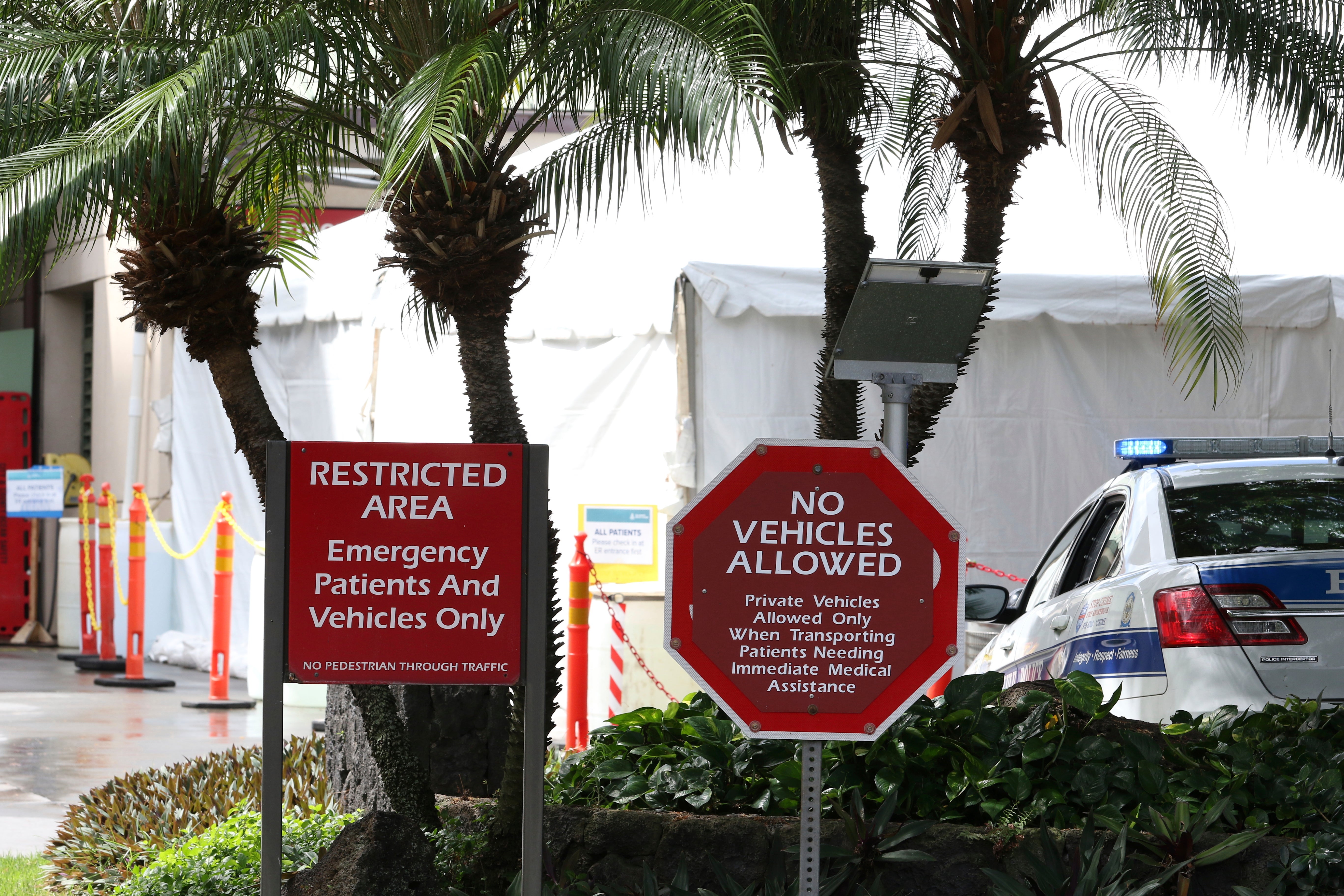Hawaii health care workers decry lack of COVID mandates
Health care workers in Hawaii say a lack of government action is worsening an already crippling surge of coronavirus cases in the islands, and without effective policy changes the state’s limited hospitals could face a grim crisis

Your support helps us to tell the story
From reproductive rights to climate change to Big Tech, The Independent is on the ground when the story is developing. Whether it's investigating the financials of Elon Musk's pro-Trump PAC or producing our latest documentary, 'The A Word', which shines a light on the American women fighting for reproductive rights, we know how important it is to parse out the facts from the messaging.
At such a critical moment in US history, we need reporters on the ground. Your donation allows us to keep sending journalists to speak to both sides of the story.
The Independent is trusted by Americans across the entire political spectrum. And unlike many other quality news outlets, we choose not to lock Americans out of our reporting and analysis with paywalls. We believe quality journalism should be available to everyone, paid for by those who can afford it.
Your support makes all the difference.Health care workers in Hawaii say a lack of government action is worsening an already crippling surge of coronavirus cases in the islands, and without effective policy changes the state’s limited hospitals could face a grim crisis.
“Soon we’re going to be in a situation where we’re going to ration health care,” said Dr. Jonathan Dworkin, an infectious diseases specialist in Hawaii.
Dworkin said that while mandates may be unpopular, rationing Hawaii's limited health care resources is “going to be far more ugly.”
“It involves making decisions about who lives and dies,” he said. “I hate the idea of having to make a decision about who’s going to get oxygen.”
Dworkin said another stay-at-home order may be needed.
“I don’t like the idea of doing that, but we’re in a situation where the hospitals are very strained, where care for non-COVID patients is becoming very difficult, where we’re in danger of running out of oxygen.”
Doctors across the state have made recommendations that they say could help Hawaii curb the spread of the delta variant.
They say the state has failed to implement a variety of measures officials agreed to last year, including ramping up rapid testing, installing better air filtration systems in schools and businesses and improving contact tracing.
Some believe a more robust screening process for travelers that includes two tests, one before travel and another after arrival, could also help slow the spread of disease.
“For an island state not to take border control seriously is, in my mind, an epidemiological crime,” Dworkin added. However, “the best impact for strict border control would have been a few months ago.”
Before July, Hawaii reported a seven-day average of 46 daily cases. On Friday that number stood at 881.
And even as hospitals fill up and morgues bring in portable containers for bodies, leaders have made virtually no major changes in policy.
The state recently announced that groups larger than 10 people indoors and 25 outdoors could not gather, but a party of more than 300 people that was broken up by police on a beach last weekend went without any citations for COVID-19 violations.
A vaccine pass for restaurants, bars and other businesses was announced for Oahu, but that program won’t begin for several weeks, and gains from incentivizing vaccines could be months away.
The governor recently suggested that people stop traveling to Hawaii until the end of October, but he didn’t change any official travel rules.
Gov. David Ige did not immediately respond to a message Thursday from The Associated Press about the health care workers' concerns.
The governor did post a video on social media pleading with people to act responsibly over the holiday weekend.
“The state of Hawaii is struggling with an unprecedented and disastrous surge in COVID-19 cases,” Ige said. “Our hospitals are being pushed to the limit.”
Ige asked travelers to voluntarily test after arriving in the islands and for people to set their own nightly curfews, avoid crowds and wear masks.
The governor also quietly signed an order this week that releases health care workers and hospitals from liability during the surge.
Hospitals and health workers "shall be immune from civil liability for any death or injury ... alleged to have been caused by any act or omission by the health care facility" the order said, with legal caveats including misconduct and negligence.
Officials say only a small fraction of cases have been directly tied to tourists.
But hundreds of thousands of visitors and residents began traveling in July when travel rules eased. Hotels and beaches were full, local families got together for birthday parties and reunions, and tourists packed into luaus and restaurants.
“Travel started increasing and we started seeing our cases rising,” said Dr. Kapono Chong-Hanssen, medical director of the Kauai Community Health Center. "And from there, you know, you’ve really just seen this skyrocketing surge in cases.”
State Department of Health Director Dr. Libby Char said they are likely missing cases among visitors who have may not test while on vacation.
“Are we undercounting travelers that are arriving or that subsequently become sick? Yeah, probably we are,” Char said. “If they’re not testing, then it makes it really difficult to identify those people.”
And now the delta variant has been ripping through Hawaii’s unvaccinated residents. Even though the state has among the highest vaccination rates in the nation, the surge has repeatedly set records for the highest case and death counts since the start of the pandemic. About 75% of Hawaii residents eligible for the vaccine are fully vaccinated, according to the state dashboard. Children 11 and younger can't sign up yet.
Hawaii had enjoyed among the lowest infection, death and hospitalization rates in the nation before the delta outbreak.
On the island of Kauai, where officials enacted strict rules including a two test screening process, the virus was virtually nonexistent before travel resumed.
The state’s Department of Health officer for Kauai, Dr. Janet Berreman, said that contact tracing on the island has proved that travel seeds local outbreaks, and that’s true for both visitors and residents alike.
“When residents travel and come home, they often live in multigenerational households. They go to work, they go to school, they see their friends. So lots and lots and lots of transmission from one or two people in the household,” Berreman said.
Another problem for hospitals is that now that hotels are full with tourists, the state has ended a program where rooms were being made available for patients needing quarantine.
“We were able to help coordinate discharge to hotel rooms where they could safely quarantine until their quarantine period was out so that the risk of transmission, the risk of infection and illness in their family members would be greatly reduced,” said Jennifer Tucker, a nurse practitioner at one of the state’s largest hospitals. “We don’t have that option anymore. We are sending people home.”


